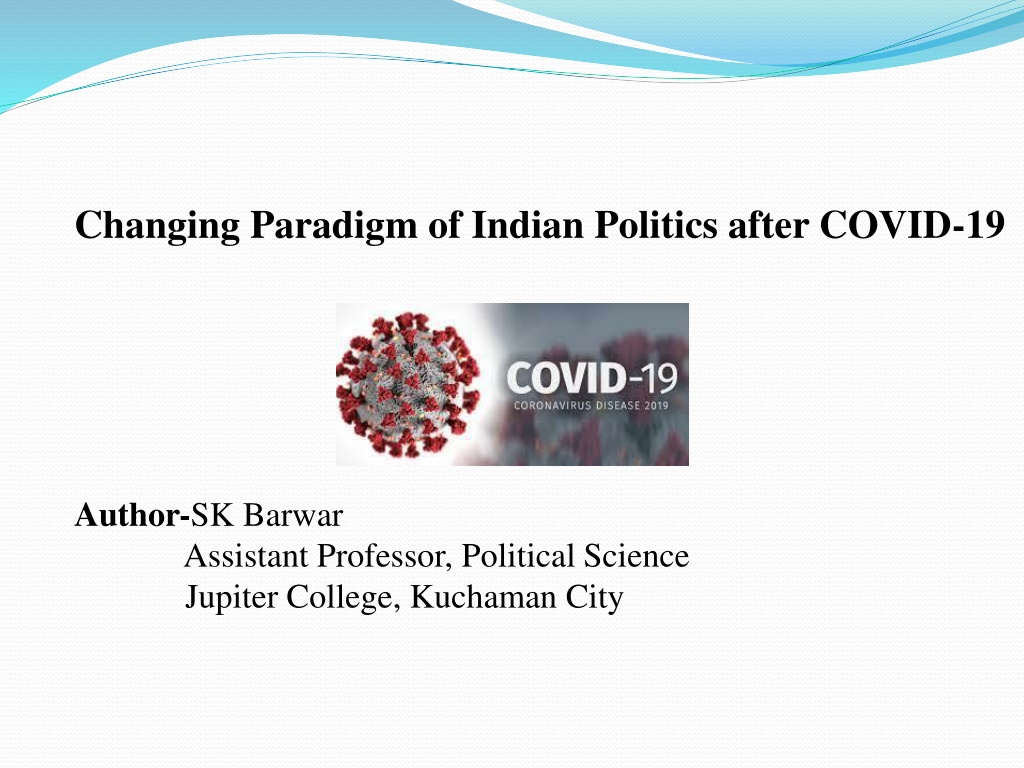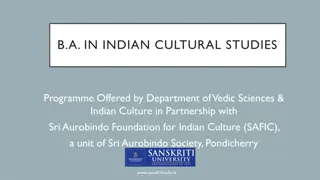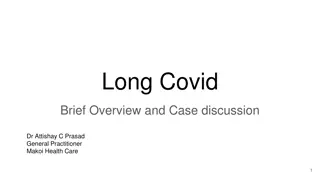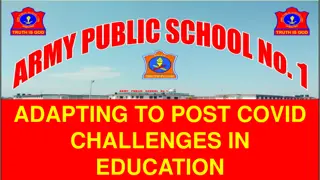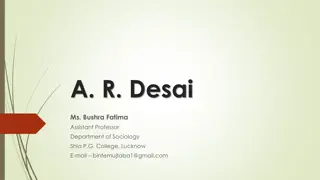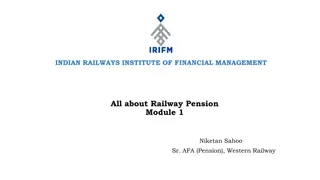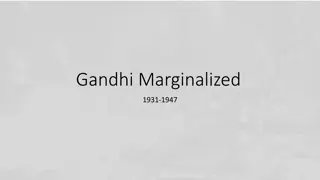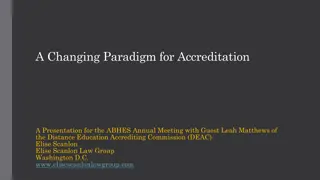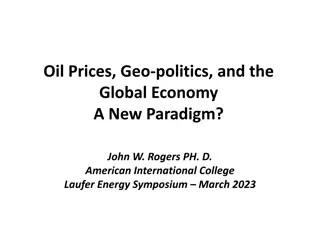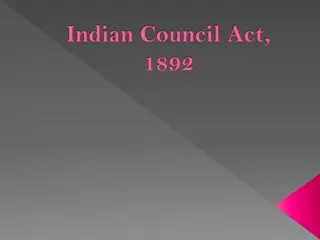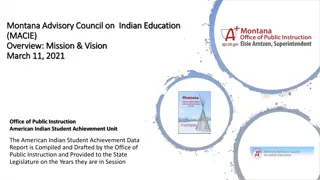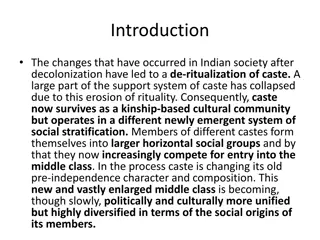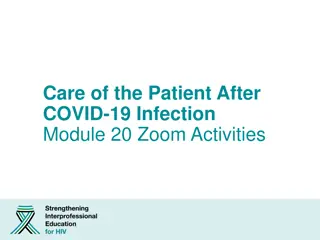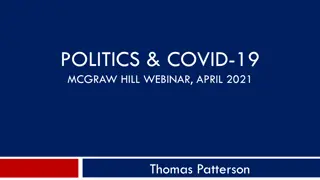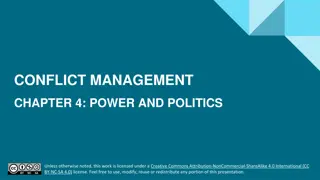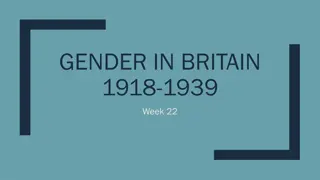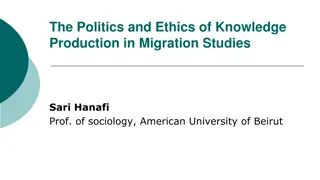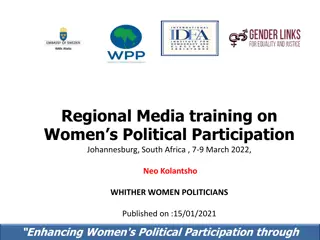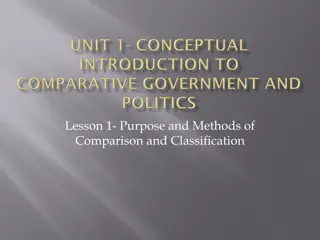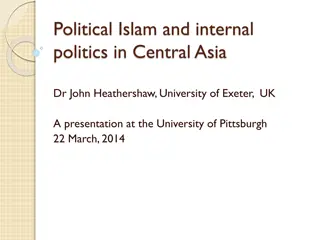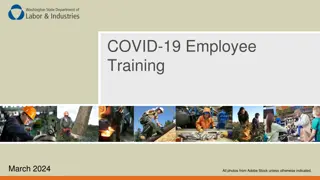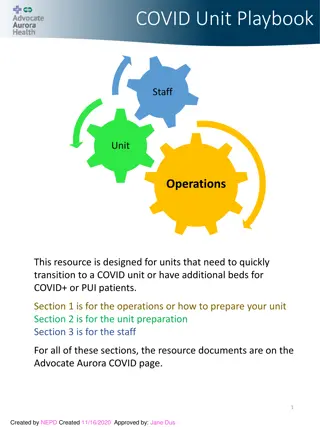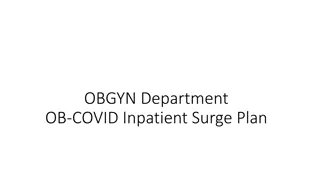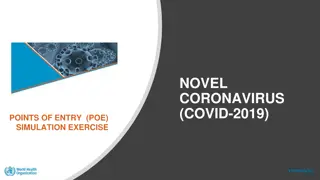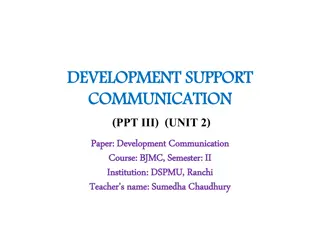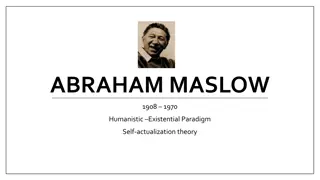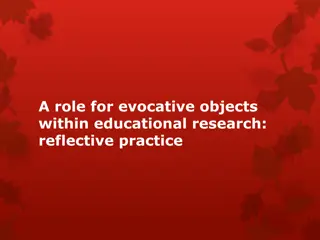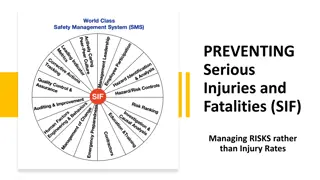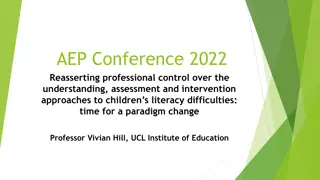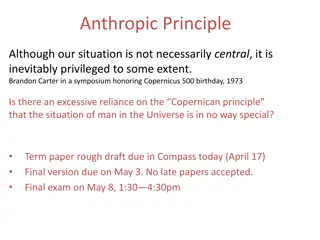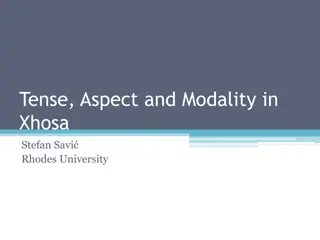Changing Paradigm of Indian Politics Post-COVID-19
The impact of COVID-19 on Indian politics has been significant, leading to changes in public management, digital platforms, and political behavior. The pandemic has brought about a shift in the way politicians interact with the public, with a focus on cooperation and solidarity. Despite challenges, the resilience of Indian democracy is evident through events like the Bihar assembly elections and efforts to combat communal narratives surrounding the virus.
Download Presentation

Please find below an Image/Link to download the presentation.
The content on the website is provided AS IS for your information and personal use only. It may not be sold, licensed, or shared on other websites without obtaining consent from the author. Download presentation by click this link. If you encounter any issues during the download, it is possible that the publisher has removed the file from their server.
E N D
Presentation Transcript
Changing Paradigm of Indian Politics after COVID-19 Author-SK Barwar Assistant Professor, Political Science Jupiter College, Kuchaman City
Keywords- pandemic, public, management, digital platforms, politicians, State and the Union Territory. Abstract- This dreadful disease not only affected India but the world economically, socially, geographically and politically. India took a historic national deal to deal with COVID-19, in which lockdown, public curfew etc. are prominent. The past successes and their successful management gave inspirational guidance to the nation. The Prime Minister was repeatedly interacted with the State and the Union Territory online. During this pandemic, Opposition also talked about dealing with mutual cooperation and all the politicians addressed the public through digital platforms. The epidemic has changed the way of education not only in India but also in the education of people all over the world. There has been no change in power, but Indian politics has not been good in terms of behavior. India, for the first time, has come forward in solidarity against infection after the WHO declared it a global pandemic. India's moral support in South Asia rests on things like political dominance versus historical ties.
Introduction- Corona became associated with people's lives in the form of an epidemic in such a way that it continues to feel every aspect of life even today. The Novel Corona virus, which originated from the city of Wuhan in China, is an example of a virus of this group, whose infection is rapidly emerging as an outbreak of the virus in 2019-20. In India, all unnecessary work has been stopped for its prevention, and people have been instructed to stay in their homes. Prevention is the only solution, in view of this; the government has announced a lockdown in the entire country till May 17. Was given, which was increased to 31 May, even after this the lockdown continued till 31 July with some relaxation. Whether it is a matter of getting the vaccine today or is it on curry that more and more vaccines have been done, in two of us some people have lost their lives, still people are in shock or every area has been affected. The Greats of the Past and their Deep Impact and Lasting Socio-Political Effects Present History.
We all want to forget the havoc of Corona like a nightmare, but despite the arrival of the vaccine, the COVID-19 pandemic is increasing its outbreak like the mouth of Sursa. Any pandemic is usually a health crisis, but the COVID-19 pandemic caused by the corona virus is going far beyond that severely affecting all aspects of our democracy, society, culture and life. Bihar assembly elections were held in October- November last year. A section of the Indian media is also running a campaign like Muslims being behind the spread of corona infection. Because a third of India's total corona infection cases have been found in Muslims who attended an Islamic religious event in New Delhi in March. IS Doran JP Nadda appealed to the party leaders not to give a communal color to the issue of spreading infection? In many states, including the assembly elections in Bengal, the trumpet for panchayat elections was sounded, in which masks, sanitizers and physical distance are not being followed. The overwhelming turnout is an indicator that the passion of our democracy is bent on neutralizing the onslaught of Corona, no matter what the cost, but the price is terrible.
At Glance World Level- India's role has been decided at the global level in times of crisis, the country's stature has also increased. From the very beginning, China has been evasive about the comprehensive investigation of the corona infection and the Trump administration also made some efforts to curb the increasing dominance of China's stature and the Corona crisis has also exposed many international institutions. Among them, the name of the United Nations Security Council (UNSC) will come at the top. This institution could not even pass a resolution against this calamity which has created a furore in the whole world. WHO remained directionless during this period? Other global institutions also seemed to be losing their meaning. Keeping this in mind, Prime Minister Modi in his address to the United Nations General Assembly strongly advocated for the reform of these institutions. His arguments were supported by many global leaders.
In the post-Corona world, these institutions will have to change their attitude; otherwise they will become more irrelevant India's vaccine diplomacy was booming in the world, before the onset of the crisis, India's position in the production and availability of masks, PPE kits and other items was not good. Undoubtedly the political leadership of India Or it is the result of coordinated efforts that respect for him has increased all over the world. From the President of Brazil to the head of the World Health Organization, they are engaged in praise. Balancing life and livelihood in times of pandemic or side politics is a difficult task. Due between superpowers like America and China due to the Corona crisis, there is a possibility of serious impact on global politics. Formed a special working group in collaboration with neighboring countries and regional organizations like SAARC and BIMSTEC to prevent the spread of corona virus directly or indirectly in India. Will write a new chapter in changing global politics. An unprecedented crisis has arisen before the world in the form of corona virus and the speed with which it is spreading makes it all the more worrying. India has also sent the medicine to countries like Myanmar, Brazil and Indonesia, including the US, Seychelles and Mauritius. to the confrontation
Indian polity in Crisis Era-The Prime Minister assured full cooperation for the education of the children who lost their parents due to the COVID pandemic. Appealed to make PM Cares scheme a success or encourage children to make yoga or fitness a part of their daily routine. Elections in the five states of the country, West Bengal, Assam, Tamil Nadu, Kerala, Pondicherry were announced at the end of February. The first COVID protocol was made by the Election Commission. It was started during the elections to the Bihar Legislative Assembly. Bihar was the first state in India where elections were held during the Corona pandemic. A maximum of 1000 voters will be able to vote at the polling station. All measures have been taken to prevent infection by wearing a mask. Voting will be held from 7 am to 6 pm. Nothing has been said in the guidelines regarding virtual rally and digital campaign. To implement the instructions under the Disaster Management Act 2005, it is the responsibility of the state governments to follow the guidelines related to COVID in election public meetings. During the epidemic, South Korea was a great example, which also conducted elections during the epidemic.
The Covid-19 disaster has knocked over a changing world order, where efforts are being made to build a global image through a politics of generosity in the midst of accusations and post- corona through politics of power. The COVID-19 Epidemic Health Organization (WHO) declared COVID-19 a pandemic and called on all countries to take immediate and prompt action against this public health crisis. As of 11 September 2020, 215 countries and territories worldwide have been affected by this pandemic. According to the WHO, there are more than 279 million confirmed cases worldwide with over 9.5 million deaths. The mortality rate in corona cases is 3.2 percent. The Government of India has challenged COVID-19 with the highest level of political commitment. The nationwide lockdown was a bold decision by the government, beginning with a self-imposed Janata Curfew by a large crowd at the call of the Prime Minister. India, the world's largest vaccine producer, is at the centre of the global vaccine diplomacy game. How will the second wave of COVID-19 affect India's international position in 2021.The failure of those in power deepens 2the tragedy. Election Commission asks political parties to strictly follow the COVID-19 guidelines issued by it. Images and videos of huge crowds at rallies show signs of rapid spread of infection. It is very easy to put all the blame on political parties and governments. And indeed politicians and their regimes have much to answer for. It is equally important to ask whether governments alone are to blame. The increasing number of cases and deaths are largely due to the careless behavior of the public.
He also informed everyone about all the steps taken by India. As India started screening people coming from abroad from January itself. PM Modi suggested the COVID-19 Emergency Fund and contributed $10 million to it on behalf of India. It also helped in the evacuation of citizens of neighboring countries from the COVID- 19 affected countries. This shows that even in times of crisis, India followed the policy of 'neighbourhood first'. India along with its citizens helped in the evacuation of people from Bangladesh, Myanmar, Sri Lanka and Nepal. To reach the goal of vaccinating one billion people against the pandemic, the biggest challenge is not the hesitation associated with vaccinating, but delivering it to the people. Reaching 200 million doses may be even more challenging than reaching the first 100 million doses.
Indian Politics Impacts- Central and state governments are working on a war footing to deal with it. People are locked in their homes. Its impact is being discussed on every field. Even on politics. Because in some way or other it is associated with the activities of every region. If other areas are affected then it will also be. But the sooner Corona's impact is visible on the health sector and the economy, the sooner the politics is going to fall. In India, earlier this kind of epidemic has had an impact on politics. Such epidemics and politics cannot be seen separately. In such a situation, it has to be understood that how the politics of India can be affected due to Corona virus. For the country, the COVID-19 is the biggest challenge so far. The conduct of elections during the COVID-19 pandemic required enormous efforts on the part of the Election Commission and the electoral administration. The Election Commission has put in place detailed guidelines and a comprehensive framework to ensure free and secure elections. State election commissions implement their own strategies by suggesting sub-national variations. The Central Government and the State Governments are seen trying to deal with this with mutual coordination. If there is a further spread of corona in India and the damage from it increases considerably, then in that case, in the days after gaining control over the spread of corona, cooperative federalism can be seen in Indian politics. National parties, such as the Bharatiya Janata Party and the Congress Party, are speaking through Twitter and periodically spokespersons and leaders of the parties are also holding press conferences. While the Bharatiya Janata Party is active on social media to spread the contribution of leaders and workers during the COVID-19, governments are also using it fiercely. Due to this virus, there has been some change in the traditional ways of politics in a big country like India. Assembly elections are to be held in six different states in India. In which Bihar, Tamil Nadu, Assam, West Bengal, Kerala and Pondicherry and about twenty five core voters will go to the polling booth in these elections. Due to the lockdown, many states had to postpone the local elections. Since the lockdown, several states have conducted elections to local bodies.
The constitutional deadline for the conduct of state assembly elections:- STATE ELECTION date ASSEMBLY Seats Assam Bihar Kerala Pondicherry March April 2021 October Nov 2020 1 June 2021 6 April 2021 126 243 140 30 Tamil Nadu 6 April 2021 234 West Bengal March April 2021 294
Bihar assembly election-While the assembly elections were held in Bihar during the Corona crisis itself, the year started with the Delhi assembly elections. The NDA alliance managed to form the government with 125 seats in the assembly elections held on 243 seats in Bihar amid the unsanitary conditions of the pandemic. Nitish Kumar has become the Chief Minister of Bihar for the seventh time.West Bengal assembly election-In view of the elections, this year there was a close fight between the BJP and the Trinomial Congress. Many strong leaders decided to leave the party and go with the BJP.Fall of Government in Madhya Pradesh-After the rebellion with the Congress, 22 supporters of Jyotiraditya Scandia, the milkman Kamal Nath government were toppled. Once again in 2020, under the leadership of Shivraj Singh Chouhan, managed to form the government in Madhya Pradesh. Congress crisis in Rajasthan- Political conflict between Chief Minister Ashok Gehlot and Deputy Chief Minister Sachin Pilot. Rhetoric at its peak, Sachin Pilot was removed from the cabinet and removed from the post of state president.Crisis in the central team of Congress-The Congress leadership is facing a crisis; this government has fallen in Madhya Pradesh. The political crisis of Rajasthan weakened the party and Rahul Gandhi, who is constantly demanding elections for the party president, resigned from the post of party president Rahul Gandhi party Resigned from the post of chairman.Harsimrat Kaur Badal, who was included in the Modi cabinet on behalf of the Akali Dal in protest against the agricultural laws, tendered her resignation on 17 September 2020. BJP Shiromani Akali Dal splits from alliance.Manipur also witnessed political upheaval, angry with Chief Minister N Biren Singh, MLAs of ally NPP withdrew their support to the government.
Conclusion-These changes will have such a wide scope in the future, which will affect both society and politics. A positive change is also showing in the country politics during the war with Corona. Political parties who criticize each other 365 days of the year are acting with restraint this time. Even in the crisis of COVID-19, when she is in power at the Centre and in many states of the country, she is facing today's crisis through governance and administration in those places. Daniel Kahneman, Nobel laureate and behavioral science expert, said that we think of the future in terms of anticipatory memories we imagine what we would remember in a normal situation. Ultimately what the future might hold, what the normalcy might look like, is a mystery. Our lack of preparedness against COVID-19 is a vision of how one ideology has supported important people and profiteers for decades. This ideology has also made irrelevant the science which is made for social welfare by innovations. Important role in implementing lockdown in all parts of the country, especially for the first time the state often tries to defend the police by downplaying the seriousness of the crime. Oral Abuse, confiscation of vehicles and other assets, assaults and arrests common during the pandemic.
References- 1. The COVID-19 Pandemic, India and the World- Raiib Bhattacharyya, Ananaya Ghosh 2.AmarUjala, News Paper. 3.Janstta, News paper. 4.Corona virus Politics: The Comparative Politics and Policy of COVID-19-Scott L. Greer Elizabeth J. king Andre Peraita - Santos 5.COVID-19 Pandemic, Public Policy, and Institutions in India. 6. India s Fight against the COVID-19 Pandemic. 7.The Politics of the COVID-19 Pandemic in India. 8.BBC News Hindi. 9.Covid-19: A year later, how politics changed and did not change-Hindustan Times. 10.India s Covid-19 Crisis: Assessing the Political Impact. 11.Prabhasakshi.com 12.pib.gov.in Dastidar, Soumven Sikdar
